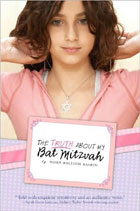Jason Blake has autism, so he doesn't do things like other students do or react in the same way to certain situations as other students might, but then he finally meets a girl who might just be his first real friend. Will she be able to see past his autism at who he really is?
Jason is not neurotypical; he has autism, so he like order and routine and dislikes loud noises. He has had a one-on-one aide at school, but this year it was decided that he was not going to have one because he has improved. Sometimes he wishes he still had her because she'd know exactly what to do in certain situations, but he has to learn to get along without her. Jason knows that the other students don't understand him or think he's weird, but this doesn't stop him from sticking to what he is used to. There is someone at school, Aaron, who sticks up for him and smooths things over when things get rough for him, and Jason feels like there's a bit of a friendship with him. Jason feels very uncomfortable in the neurotypical world (he describes this as the world of someone who doesn't have autism) and has trouble with social interactions. The only place where he seems to really feel comfortable and fit in Storyboard, his website where he publishes his fictional stories that he writes. He gets praise and positive comments for his stories. Other writers who publish their stories on Storyboard ask him for help, advice, and input for their stories. One particular writer is PhoenixBird, who later introduces herself as Rebecca. She and Jason develop a frienship and e-mail each other back and forth through their websites. She may be his first real friend (and maybe girlfriend). Later Jason finds out that he will attend a convention featuring Storyboard, and Rebecca will be there too since it's in her hometown. Jason is excited, but at the same time nervous because he is concerned that once Rebecca finds out that he has autism she won't want to be his friend anymore. With help from his parents, Jason gets help overcoming these uncomfortable situations and learns to deal with them in his own way and as a neurotypical person might.
This was an interesting book to read because for some reason I didn't realize right away that the book is written in Jason's thoughts; he never actually talks in the book, and when he does, he doesn't say much. The book is told through Jason's point of view and through his thoughts as though he were a "neurotypical" (someone who doesn't have autism). It took me a little while to realize this, and it surprised me. I wasn't expecting the book to be told in this way. He, as a person with autism, was going through the same feelings and situations that anyone his age would go through.
As I was reading this book, I thought of my five-year-old cousin who was also diagnosed with autism, and it made me thing what it would be like for him when he gets to middle school. I know his parents did their research and informed themselves about autism and are doing everything they can to help him, but I feel that it might be beneficial for them to read about how a family, albeit fictional, handles their situation. I think that's the nice thing about fiction: it can be therapeutic.
The book's title refers to Jason because he goes through the same situations that a typical person would go through, such as feeling awkward, having a crush on someone, and wanting to fit in, but he is anything but typical because he has autism, and that sets him apart from others. This book received the Schneider Family Book Award. Visit Nora Raleigh Baskin's website at http://www.norabaskin.com/ or her sister site at http://web.mac.com/norabaskin/Site/a_little_more....html to learn about the author and to see other books she's written such as All We Know of Love, The Truth About My Bat Mitzvah, and In the Company of Crazies.




No comments:
Post a Comment